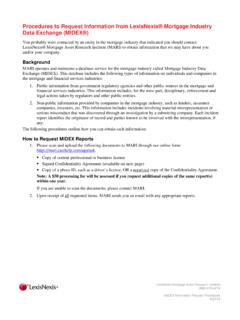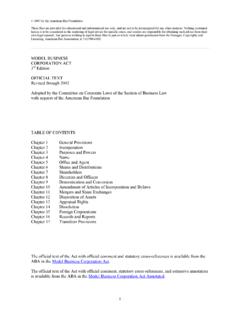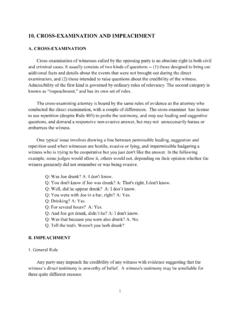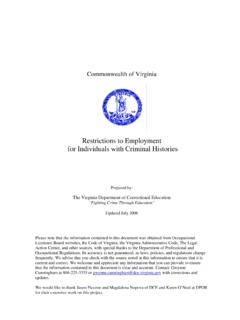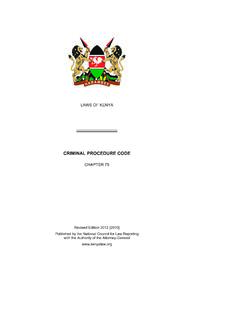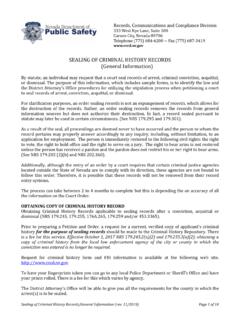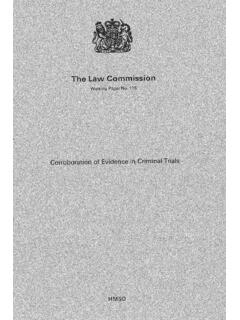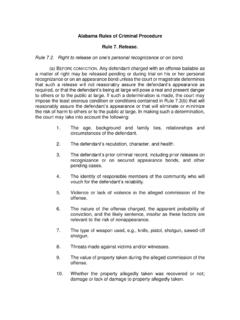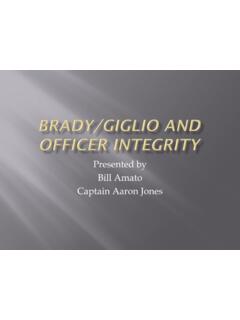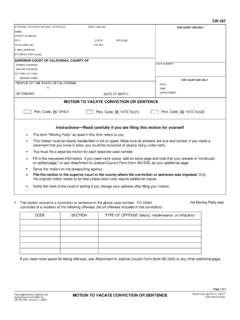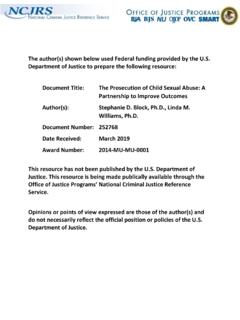Transcription of 2021 Federal Rules of Evidence - LexisNexis
1 2022 Federal Rules of EvidenceCompliments ofFEDERAL Rules OF EVIDENCEI 1 Rule 101 Rule 102 Rule 103 Rule 104 Rule 105 Rule 106 II 4 Rule 201 III 5 Rule 301 Rule 302 IV 6 Rule 401 Rule 402 Rule 403 Rule 404 Rule 405 Rule 406 Rule 407 Rule 408 GENERAL PROVISIONS Scope; DefinitionsPurpose Rulings on EvidencePreliminary QuestionsLimiting Evidence That Is Not Admissible Against Other Parties or for Other Purposes Remainder of or Related Writings or Recorded StatementsJUDICIAL NOTICE Judicial Notice of Adjudicative FactsPRESUMPTIONS IN CIVIL ACTIONS Presumptions in a Civil Case GenerallyApplying State Law to Presumptions in Civil CasesRELEVANCE AND ITS LIMITS Test for Relevant EvidenceGeneral Admissibility of Relevant Evidence Excluding Relevant Evidence for Prejudice, Confusion, Waste of Time, or Other ReasonsCharacter Evidence .
2 Other Crimes, Wrongs or ActsMethods of Proving CharacterHabit; Routine PracticeSubsequent Remedial MeasuresCompromise Offers and Negotiations2022 Federal Rules of EvidenceRule 409 Offers to Pay Medical and Similar ExpensesRule 410 Pleas, Plea Discussions, and Related StatementsRule 411 Liability InsuranceRule 412 Sex-Offense Cases: The Victim s Sexual Behavior or PredispositionRule 413 Similar Crimes in Sexual-Assault CasesRule 414 Similar Crimes in Child-Molestation CasesRule 415 Similar Acts in Civil Cases Involving Sexual Assault or Child MolestationV PRIVILEGES 16 Rule 501 Privilege in GeneralRule 502 Attorney-Client Privilege and Work Product.
3 Limitations on WaiverVI Rule 601 Rule 602 Rule 603 Rule 604 Rule 605 Rule 606 Rule 607 Rule 608 Rule 609 Rule 610 Rule 611 Rule 612 WITNESSES 19 Competency to Testify in GeneralNeed for Personal KnowledgeOath or Affirmation to Testify TruthfullyInterpreterJudge s Competency as a WitnessJuror s Competency as a WitnessWho May Impeach a WitnessA Witness s Character for Truthfulness or Untruthfulness Impeachment by Evidence of a criminal Conviction Religious Beliefs or OpinionsMode and Order of Examining Witnesses and Presenting EvidenceWriting Used to Refresh a Witness s MemoryCompliments ofRule 613 Witness s Prior StatementRule 614 Court s Calling or Examining a WitnessRule 615 Excluding WitnessesVII OPINIONS AND EXPERT TESTIMONY 27 Rule 701 Opinion Testimony by Lay WitnessesRule 702 Testimony by Expert WitnessesRule 703 Bases of an Expert s Opinion TestimonyRule 704 Opinion on an Ultimate IssueRule 705 Disclosing the Facts or Data Underlying an Expert s OpinionRule 706 Court-Appointed Expert WitnessesVIII HEARSAY 29 Rule 801 Definitions That Apply to This Article.
4 Exclusions from HearsayRule 802 The Rule Against HearsayRule 803 Exceptions to the Rule Against Hearsay Regardless of Whether the Declarant is Available as a WitnessRule 804 Exceptions to the Rule Against Hearsay When the Declarant is Unavailable as a WitnessRule 805 Hearsay Within HearsayRule 806 Attacking and Supporting the Declarant s CredibilityRule 807 Residual ExceptionIX AUTHENTICATION AND IDENTIFICATION 43 Rule 901 Authenticating or Identifying EvidenceRule 902 Evidence That Is Self-AuthenticatingRule 903 Subscribing Witness s Testimony2022 Federal Rules of EvidenceX CONTENTS OF WRITINGS, 4 RECORDINGS, AND PHOTOGRAPHSRule 1001 Definitions That Apply to This ArticleRule 1002 Requirement of the OriginalRule 1003 Admissibility of DuplicatesRule 1004 Admissibility of Other Evidence of ContentRule 1005 Copies of Public Records to Prove ContentRule 1006 Summaries to Prove ContentRule 1007 Testimony or Statement of a Party to Prove ContentRule 1008 Functions of the Court and JuryXI MISCELLANEOUS Rules Rule 1101 Applicability of the RulesRule 1102 AmendmentsRule 1103 Title1 Compliments ofFEDERAL Rules OF EVIDENCEARTICLE I.
5 GENERAL PROVISIONSRule 101. Scope; Definitions(a) Scope. These Rules apply to proceedings in United States courts. The specific courts and proceedings to which the Rules apply, along with exceptions, are set out in Rule 1101.(b) Definitions. In these Rules :(1) civil case means a civil action or proceeding;(2) criminal case includes a criminal proceeding;(3) public office includes a public agency;(4) record includes a memorandum, report, or data compilation;(5) a rule prescribed by the Supreme Court means a rule adopted by the Supreme Court under statutory authority; and(6) a reference to any kind of written material or any other medium includes electronically stored 102.
6 PurposeThese Rules should be construed so as to administer every proceeding fairly, eliminate unjustifiable expense and delay, and promote the development of Evidence law, to the end of ascertaining the truth and securing a just Federal Rules of Evidence2 Rule 103. Rulings on Evidence (a) Preserving a Claim of Error. A party may claim error in a ruling to admit or exclude Evidence only if the error affects a substantial right of the party and:(1) if the ruling admits Evidence , a party, on the record:(A) timely objects or moves to strike; and(B) states the specific ground, unless it was apparent from the context; or(2) if the ruling excludes Evidence , a party informs the court of its substance by an offer of proof, unless the substance was apparent from the context.
7 (b) Not Needing to Renew an Objection or Offer of Proof. Once the court Rules definitively on the record either before or at trial a party need not renew an objection or offer of proof to preserve a claim of error for appeal.(c) Court s Statement About the Ruling; Directing an Offer of Proof. The court may make any statement about the character or form of the Evidence , the objection made, and the ruling. The court may direct that an offer of proof be made in question-and-answer form.(d) Preventing the Jury from Hearing Inadmissible Evidence . To the extent practicable, the court must conduct a jury trial so that inadmissible Evidence is not suggested to the jury by any means.
8 (e) Taking Notice of Plain Error. A court may take notice of a plain error affecting a substantial right, even if the claim of error was not properly ofRule 104. Preliminary Questions(a) In General. The court must decide any preliminary question about whether a witness is qualified, a privilege exists, or Evidence is admissible. In so deciding, the court is not bound by Evidence Rules , except those on privilege.(b) Relevance That Depends on a Fact. When the relevance of Evidence depends on whether a fact exists, proof must be introduced sufficient to support a finding that the fact does exist. The court may admit the proposed Evidence on the condition that the proof be introduced later.
9 (c) Conducting a Hearing So That the Jury Cannot Hear It. The court must conduct any hearing on a preliminary question so that the jury cannot hear it if:(1) the hearing involves the admissibility of a confession;(2) a defendant in a criminal case is a witness and so requests; or(3) justice so requires.(d) Cross-Examining a Defendant in a criminal Case. By testifying on a preliminary question, a defendant in a criminal case does not become subject to cross-examination on other issues in the case.(e) Evidence Relevant to Weight and Credibility. This rule does not limit a party s right to introduce before the jury Evidence that is relevant to the weight or credibility of other Federal Rules of Evidence4 Rule 105.
10 Limiting Evidence That Is Not Admissible Against Other Parties or for Other PurposesIf the court admits Evidence that is admissible against a party or for a purpose but not against another party or for another purpose the court, on timely request, must restrict the Evidence to its proper scope and instruct the jury 106. Remainder of or Related Writings or Recorded StatementsIf a party introduces all or part of a writing or recorded statement, an adverse party may require the introduction, at that time, of any other part or any other writing or recorded statement that in fairness ought to be considered at the same II.



